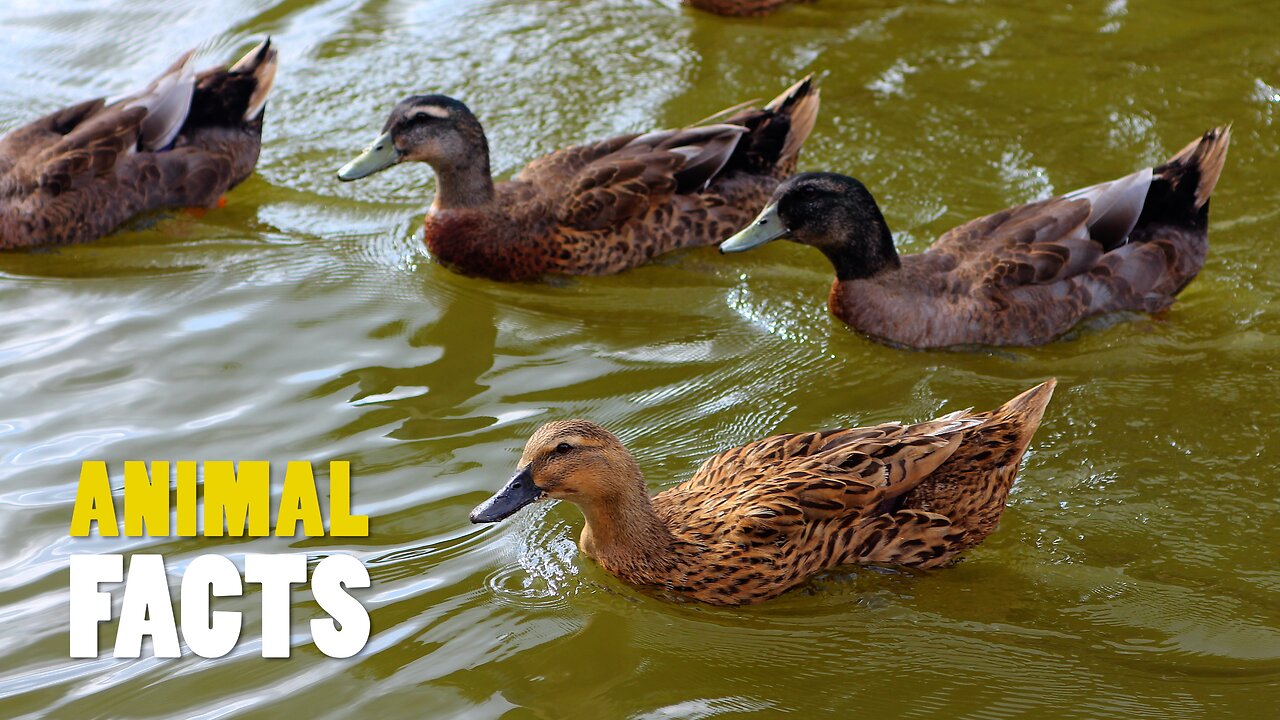Premium Only Content

Ducks | Versatile masters of water
For video production services contact [email protected] https://www.inspiredrisk.com/
Ducks are some of the most versatile birds, found in lakes, rivers, and even cities. They’re excellent swimmers, using their webbed feet to paddle through water with ease. Ducks have waterproof feathers that help keep them dry while diving, and their beaks are perfectly adapted for filtering food from the water. These social birds often travel in groups called "rafts" and can be seen waddling on land, dabbling for food, or flying in V-shaped formations. Despite their playful nature, ducks are incredibly resourceful, using their keen senses to find food and navigate their habitats.
If you’re willing and able, here are just some actions you can take for Conservation, Climate Change and Animal Welfare;
. Adopt a Plant-Based Diet: Reducing or eliminating animal products lowers demand for factory farming, which is a major driver of deforestation, habitat destruction, animal cruelty and greenhouse gas emissions.
. Support Sustainable Brands and Companies: Choose products and services from companies that prioritize sustainability, ethical sourcing, reducing emissions, minimizing waste and animal welfare in their practices, such as those with certified Fair Trade, organic, or cruelty-free labels.
. Advocate for Wildlife Protection Laws: Support and raise awareness about policies that protect endangered species, regulate hunting, and safeguard critical habitats from destruction through legal means.
. Reduce Energy Consumption: Cut down on electricity and fuel use by investing in energy-efficient appliances, utilizing renewable energy sources, and adopting green practices like switching off lights when not in use and reducing car travel.
. Plant Trees and Support Reforestation Efforts: Trees are vital in the fight against climate change by absorbing carbon dioxide, protecting biodiversity, and supporting wildlife habitats. Participate in local tree-planting initiatives or donate to organizations focused on reforestation.
. Conserve Water: Freshwater is a limited resource, and conserving water helps maintain critical ecosystems and supports agricultural and wildlife needs. Use water-efficient fixtures, avoid wasting water, and support organizations that protect freshwater ecosystems and wetlands, which are vital for both wildlife and human communities.
. Educate and Raise Awareness: Spread knowledge about conservation, animal welfare, and environmental issues. Sharing information on social media or in your community can inspire others to take action.
. Reduce, Reuse, Recycle: Minimize waste by opting for reusable products, recycling materials, and choosing items with minimal packaging to reduce landfill waste and conserve natural resources.
. Volunteer for Conservation Projects: Donate time to wildlife rescue centers, local environmental groups, or global conservation organizations. Direct involvement in conservation efforts can have a meaningful impact on local ecosystems.
. Choose Eco-Friendly Travel: When possible, opt for sustainable travel options like walking, biking, or using public transport. When traveling long distances, support eco-conscious tourism operators that prioritize conservation and minimize their carbon footprint.
. Advocate for Climate Policy: Contact local representatives, vote for pro-environmental policies, and join climate advocacy groups pushing for legislative change.
. Compost: Start composting organic waste to reduce landfill contributions and improve soil health.
. Support Sustainable Tourism: Travel responsibly by choosing eco-friendly tours and hotels that prioritize sustainability and wildlife protection.
. Support Wildlife Corridors: Advocate for and support the creation of wildlife corridors that help animals move safely through their habitats.
. Participate in Clean-Up Initiatives: Join local efforts to clean up beaches, rivers, or parks to remove trash that can harm wildlife.
. Practice Sustainable Gardening: If you're growing a garden, use eco-friendly techniques that reduce pesticide use and support biodiversity.
. Adopt, Don’t Shop: Consider adopting rescue animals instead of buying from breeders or pet stores, helping reduce the demand for animal breeding and the number of animals in shelters.
-
 14:22
14:22
Exploring With Nug
8 hours agoThe River Exposed a Secret That No One Was Supposed to See!
14.1K1 -
 LIVE
LIVE
Tundra Tactical
3 hours ago🛑{LIVE NOW!!} The Great Tundra Nation Gun Show!!!! Presented By MGS Trade School
1,492 watching -
 23:23
23:23
MYLUNCHBREAK CHANNEL PAGE
9 hours agoThe Sunken Basilica
68.9K4 -
 LIVE
LIVE
GamerGril
3 hours agoShould I Get A Zoob Job 💞Dying Light The Beast💞
176 watching -
 5:00:18
5:00:18
MattMorseTV
7 hours ago $207.50 earned🔴No Kings "protest" TOTAL CHAOS.🔴
293K413 -
 1:28:51
1:28:51
Darkhorse Podcast
5 hours agoCan the internet make you sick? The 297th Evolutionary Lens with Bret Weinstein and Heather Heying
25.5K10 -
 1:39:04
1:39:04
TinyPandaface
4 days agoYour FACE is a Gaming Channel! | Homebody PART 2!
5K -
 1:21:31
1:21:31
Michael Franzese
18 hours agoTrump Derangement Syndrome Is On The Way Out | Live with Michael Franzese
107K101 -
 LIVE
LIVE
ZWOGs
3 hours ago🔴LIVE IN 1440p! - ARC RAIDERS SERVER SLAM - Come Hang Out!
37 watching -
 9:22
9:22
Colion Noir
9 hours agoArmed Woman Drags Gunman Out of Store Before Firing Two Shots
87.9K42